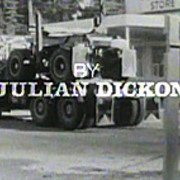
Julian Dickon
Julian Dickon began his long writing career in his native England. His mother was a novelist. Later Julian managed to sell two short stories to the BBC, in between stints as a soldier and kangaroo-hunter, and five years as a merchant seaman.
Dickon moved to New Zealand in the early 60s, and worked as rabbiter and forestry worker. He then began writing radio serials and adapting works by legendary writers (Leo Tolstoy, Dorothy Parker, Nikolai Gogol) for the NZ Broadcasting Corporation, some of which successfully sold to the countries they had originated from.
In 1969 the NZBC decided to create its own in-house department for television drama, and new TV drama head Bill Austin encouraged Dickon to apply his talents to the new medium. Dickon first step into television was an adaptation of his radio play Green Gin Sunset, followed by The Genuine Plastic Marriage, which starred future Close to Home actor Glenis Levestam. The Feltex award-winning Sunset featured Grant Tilly as a newly-wedded merchant seaman choosing between settling down, or heading back to sea.
Rivalries between radio and the new medium were strong; Dickon later argued that his radio background did him no good when it came to getting television work, where some saw him as a "slightly passe" radio writer. Ironically, after writing his first TV projects he found it difficult to secure more radio work.
In 1970 Dickon was commissioned to develop pioneering Kiwi drama series Pukemanu. In her book Ourselves in Primetime, Trisha Dunleavy calls the show “a rite of passage for the genre because it was the first real victory over cultural cringe”, decisively rejecting earlier TV attempts to emulate British styles. Dickon wrote about his experiences with the show here.
Centred around a working class timber town, Pukemanu was based on Dickon’s own time working for the NZ Forest Service around Taupō. The show was a hot-bed for a new generation of talent, including director Tony Isaac, writers Michael Noonan and Hamish Keith, and writer/actor Ian Mune. Creative conflicts with executive producer Douglas Drury meant that Dickon ended up leaving the series after having created the concept, characters and writing three episodes, including the first, 'Pukemanu Welcomes You'.
The versatile Dickon would go on to work across many other genres, adapting Ngaio Marsh murder mysteries (1978‘s Vintage Murder) a number of children's shows, and documentary writing (Star of David, adventure series Challenge). He also worked as both a writer and script editor on another pioneering show in NZ TV history, Close to Home.
Jocko showed Dickon once again writing about people working on the land, an area surprisingly little explored on our screens considering how many worked in rural jobs. The show was born when director Mark DeFriest asked Dickon if he had any ideas for a one-hour drama. He came up with 1980‘s High Country, whose cast of characters included wandering shepherd Jocko, and his offsider China.
Jocko would quickly spawn two seasons of his own, further plugging into Australasian myths of bushman and man of the land. Dickon wrote the first, and based his scripts for the second on storylines commissioned from other writers. Described by writer Trisha Dunleavy as “laconic, resourceful, disrespectful of authority and rarely solvent”, Jocko (Bruce Allpress) travelled the backroads with his old mate (Desmond Kelly). The second series, which rated better than the first, saw the duo marooned in a small town.
During this period, producer John Whitwell asked Dickon to pen scripts for three seasons of children’s series Sea Urchins (including this episode), based around a trio’s adventures in their small open sail boat Kina. Dickon got royalties from the show’s sales overseas, and was commissioned to write an accompanying novel. But the closure of its publishing company meant the book — and payment — never eventuated.
Following Sea Urchins, Dickon’s wife Sara suggested he write something for a female audience. Long curious about what makes a champion, Dickon came up with teen and horse tale Moon Jumper. The title was inspired by a moment where the lead character says “I want this horse to jump over the moon”. The series also spawned three novels, the first written by Dickon.
Dickon had fond memories of adapting Frank Sargeson tale Old Man’s Story for a short film directed by Yvonne Mackay. He also worked extensively on an unrealised script for WW1 conscientious objector tale Hard Road, including gruelling scripting sessions alongside Ingmar Bergman’s longtime collaborator Ulla Ryghe (Ryghe has another Kiwi connection, as co-producer of early Jane Campion short Peel).
Julian Dickon passed away in Katikati on 3 April 2015. He was 86.
Profile updated on 22 April 2021
Sources include
Julian Dickon
'Funeral Notices for April 2015' Whanganui Online website. Accessed 9 April 2015
Trisha Dunleavy, Ourselves in Primetime: A History of New Zealand Television Drama (Auckland University Press, 2005)